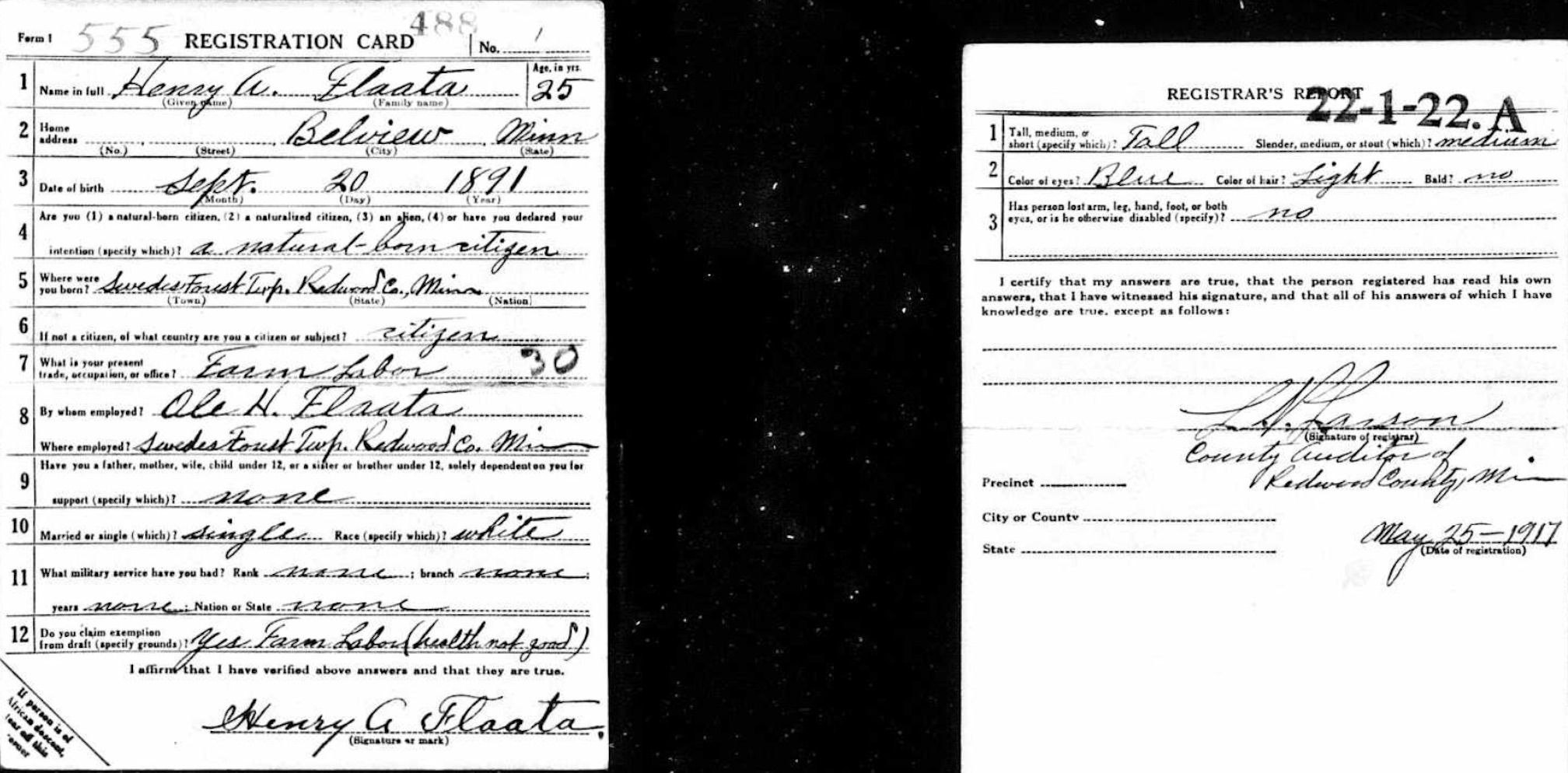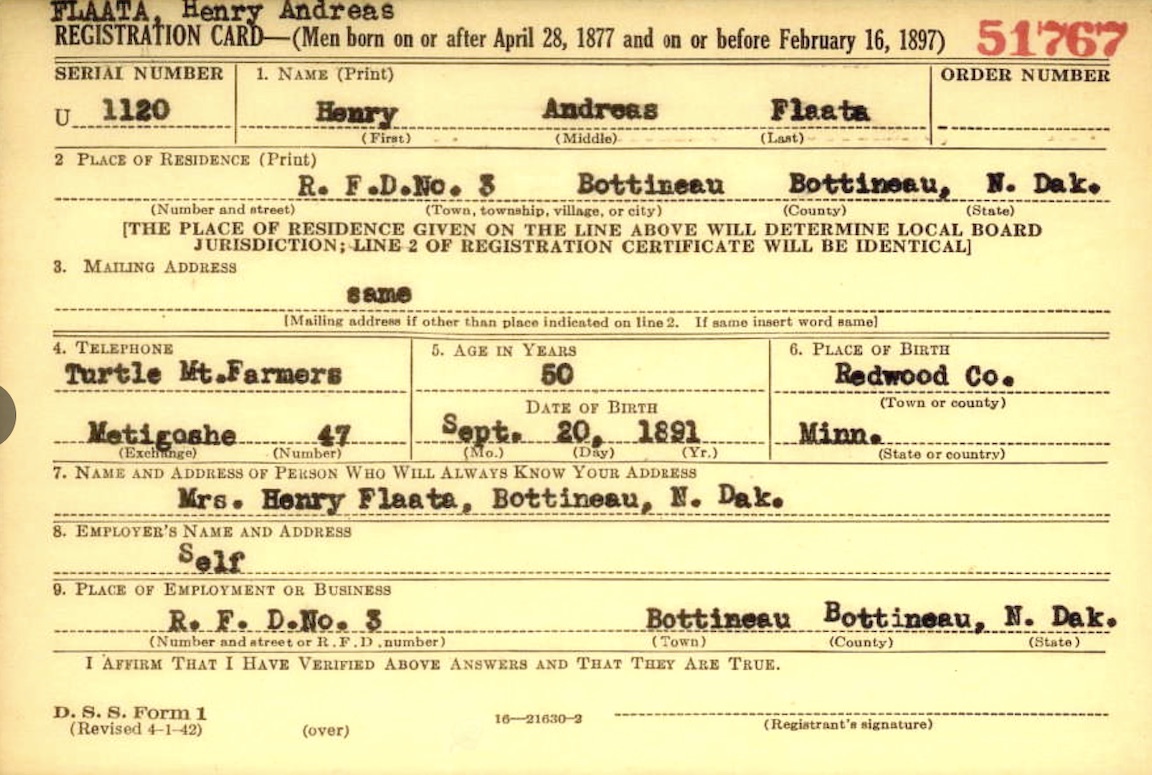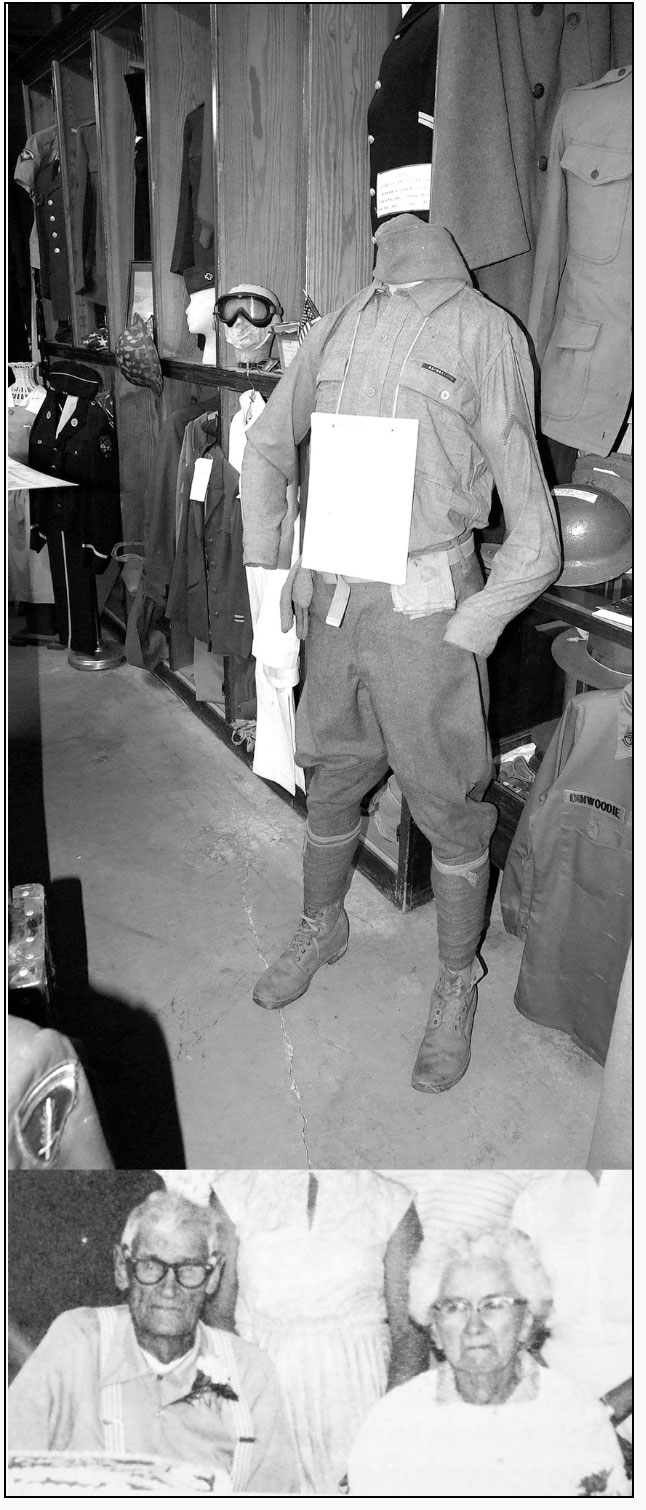Comments regarding Private Henry A. FLAATA
|
|||||
Article in the North Dakota Bottineau Courant
NewsVeteran remembered during ArmisticeScott Wagar 11/05/2013
Individuals, who walk into the Bottineau County Museum and visit the military exhibit, will discover a World War I uniform that belong to Henry Flaata, a man who saw numerous battles on French soil. Flaata was born in Belview, Minn., in 1891 where he attended rural school. When World War I broke out, Flaata was drafted into the service where he begin a journey which would place him in some of the bloodiest battles U.S. servicemen would see in the war. “I was drafted into the military service on the 27th day of February 1918 from Redwood Galle, Minn., and went to Camp Dodge, Iowa. Here I was assigned to the 352 Supply Company,” Flaata wrote in his personal autobiography on his time as a serviceman in WWI. “After six weeks training we were moved to Camp Logan, Texas, and there I joined the 132nd Infantry, 33rd Division in which I stayed during the rest of my service.” The 132nd Infantry was a Volunteer Infantry Regiment from the state of Illinois, which started its service during the Civil War on the Union side in association with the Hundred Days Men in 1864, a military plan to increase obtainable manpower for a 100 day enlistment with the goal of an all-out push to end the war in 100 days. The infantry was organized in Chicago, Ill., and placed into service on June 1, 1864, conducting garrison duty at Paducah, Ky., until October 1864 when the Infantry was mustered out of service. The Hundred Days Men plan failed, but 132nd would make it mark over a half century later in WWI. The 132nd Infantry Regiment was organized on July 21, 1917, through a number of Illinois militia units. The regiment was assigned to the 33rd Infantry Division and redesignated on Oct. 12, 1917, as the 132 Infantry Regiment. The men were sent to train at Camp Logan, Texas. Other states then joined the Illinois units to make up the 132nd Infantry and 33rd Division. “From Camp Logan we were moved to Camp Upton, N.Y., from where we were shipped to France. We left the U.S. on the 17th of May and arrived in Brest, France on May 24, 1918,” Flaata stated in his writings. “After three weeks training we were sent to the front. While in the field, I took part in three major battles, part of the time in the front line.” Of the three major offensives Flaata fought in, one of the worse campaigns was Meuse-Argonne Offensive, which took place from Sept. 26 to Nov. 11, 1918. “One of the most grim places was in the terrible Argonne Forest. I will never forget three o’clock in the morning on Sept. 26 when were ordered to attack the enemy in the vicinity of Verdun and later in the Argonne. When the cannons begin firing together with the rattle of machine guns the clouds above turned red,” said Flaata whose company captured 63 prisoners, some machine guns and a 12-inch cannon. “Naturally, the enemy set up their own S.O.S. signals, which was the best show of fireworks I have ever seen. A man’s life at that stage was not worth much, one never knew if you could take another step or not and many never did. That day we advanced six miles. “After the battle was over, the Argonne Forest was a grim and horrible sight. So many bodies laid on the ground that we had to move them aside with our feet or step over them. Both allies and the enemy lay dead on the battlefield and with them many wounded. The wounded groaned and screamed. Some were out of their head and swearing and cursing,” Flaata continued. Flaata, who conducted a lot of forward scouting for his company, once became lost and was left in the open under a dangerous situation. “I spent many a night on patrol and reconnaissance in the so called no mans land, the area between the allies and the enemy lines. This we had to do at night as we were under observation by the enemy during daytime,” Flaata said. “One night, doing a patrol, I was for some reason or other separated from my group. I became confused and was not sure in which direction our lines were. One can think how it would be in a strange place on a pitch black night and nasty weather besides. So, I didn’t dare move in any direction as I could have wandered into the enemy’s lines as easily as our own. “There was one thing left to do and that was to find a big shell hole, of which there were plenty, and stayed there until morning,” Flaata added. “I could not go to our lines in day light as I would be a target for snipers. However, I got my directions straighten out and went back to our lines the next morning.” The company Flaata served with started with 217 men and officers, and after three weeks of battle the company was down to 63 men. On Nov. 11, World War I ended with Flaata still at the front living within the trenches of warfare. “On the day Armistice was declared we were in the front lines close to the town of Metz. After that we were stationed in Luxemburg and stayed there until April 25,” Flaata said. “From there, I went to Brest and we were shipped out on the steamship Mt. Vernon on May 9, 1919. This was the same ship that we had arrived in France on. “We arrived in New York on the 17th of May 1919,” he added. “From there, we went to Camp Dodge, Iowa, and received my discharged on May 27, 1919.” After Flaata’s discharged, he returned to Belview and worked as a farm hand on a number of different farms in the area when farmers’ needed assistance on their farmsteads. He also married Clara Abrahamson, a childhood friend, in May of 1925 and continued in his work. In the same year he married, Flaata learned of a farm for sale in Bottineau County. Interested in the prospect of owning his own farm and land, he took the train to Bottineau and purchased the farmstead. He then returned on the train and brought his new bride back to Bottineau County where they spent the remainder of their lives working on their farm. “Life was a struggle and work was the only key to survival,” stated the book, “People of Bottineau County,” which was published in 1984. “But, they pushed ahead and raised their family of five children before retiring in 1955.” The Flaatas were active members of the Vinje Lutheran Church in the Turtle Mountains and the First Lutheran Church in Bottineau after retiring and moving to Bottineau. Clara passed away first in 1981, while Henry died at the age of 92 in St. Andrew’s Health Center. Although Flaata has passed away, he has left a legacy and immortal due to the service and freedom he gave his country, which he continued as a veteran in his hard work and dedication to his family and the communities he lived in. |


